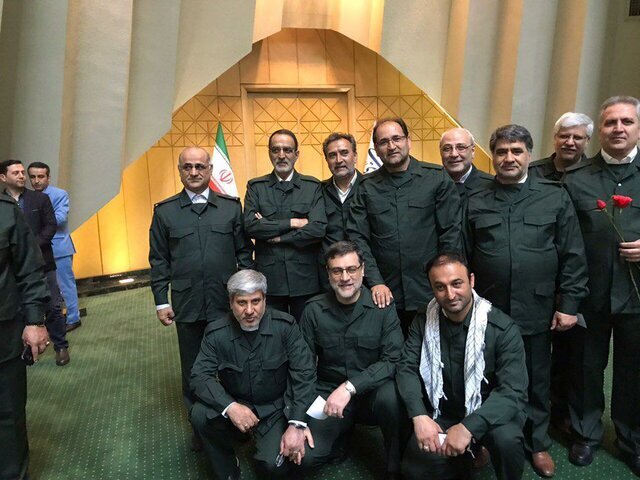The Iranian president, parliament members and other high-ranking officials strongly condemned the Trump administration for designating the Islamic Revolution Guards Corps, a branch of Iran's armed forces as a terrorist organization.
“Today, I am formally announcing my Administration’s plan to designate Iran’s Islamic Revolutionary Guard Corps (IRGC), including its Qods Force, as a Foreign Terrorist Organization (FTO) under Section 219 of the Immigration and Nationality Act,” read a White House statement released on Monday.
“This unprecedented step, led by the Department of State, recognizes the reality that Iran is not only a State Sponsor of Terrorism, but that the IRGC actively participates in, finances, and promotes terrorism as a tool of statecraft. The IRGC is the Iranian government’s primary means of directing and implementing its global terrorist campaign.”
The designation of the IRGC as a FTO will go into effect on April 15, making it the latest addition to 67 other groups worldwide, including the Palestinian organizations Hezbollah and Hamas, Palestinian Islamic Jihad, Kata’ib Hezbollah, and al-Ashtar Brigades.
In response to the White House announcement, Iran’s Foreign Minister Mohammad Javad Zarif proposed that Iran’s Supreme National Security Council (SNSC) should add American forces in West Asia to its list of terrorist groups.
On Monday, the SNSC designated the U.S. Department of Defense’s Central Command, known by its moniker CENTCOM, as a terrorist group, warning that the United States, "will be responsible for dangerous consequences" of its decision to declare the IRGC a terrorist organization.
The SNSC said in its statement that CENTCOM had implemented terrorist policies of the U.S. government against countries in West Asia, noting that it has, as a result, endangered Iran's national security and the lives of both Iranians and non-Iranians. The statement specifically mentions American participation in the military campaign in Yemen, where a civil war has pitted rebels called Houthis against the Saudi-aligned central government.
Making an address at a National Day of Nuclear Technology ceremony held on Tuesday, Iranian President Hassan Rouhani criticized the Trump administration’s decision to designate the IRGC a terrorist group and accused the U.S. of “sheltering heads of ISIS, supporting terrorist groups.”
“The same IRGC that has been fighting terrorism since the first day of its formation and has given many lives in this path, the last of which was the recent incident in Khash-Zahedan road by U.S. mercenaries, is being called terrorist by the enemies of the Iranian nation,” Rouhani said, according to his official website. “It was the IRGC that saved the peoples of the region from terrorists.”
Iran’s parliament speaker Ali Larijani denounced the designation as the “climax of stupidity and ignorance.”
Reaction elsewhere in the Middle East, however, was divided.
According to Syrian Arab News Agency (SANA), an official source at the Syrian Foreign and Expatriates Ministry said on Tuesday that Syria strongly condemns the U.S. administration against the IRGC as "a flagrant violation of the sovereignty of Iran."
In an interview with Iran’s Mehr news agency, a senior member of Turkey’s Republican People's Party (CHP), Osman Faruk Logoglu, said, “brandishing IRGC as a terrorist group is essentially an act of terror itself.”
For his turn, Iraq’s Foreign Minister Mohamed Ali Alhakim condemned the labeling of the IRGC and said Baghdad will stand by Tehran.
Israel’s recently re-elected Prime Minister, Benjamin Netanyahu, thanked the U.S. President, however, in a tweet, writing, “Once again you are keeping the world safe from Iran aggression and terrorism.”
The IRGC, which has roughly 125,000 military personnel and supposedly enjoys growing public support, is said to be actively cooperating in construction, infrastructure and relief projects throughout Iran and in Syria.
But according to the U.S. government, the IRGC has provided for years financial and other material support, training, technology transfer, advanced conventional weapons, guidance, or direction to a broad range of groups considered terrorist organizations throughout the Middle East.
The IRGC was sanctioned by the U.S. in 2007 for its support to Iran’s ballistic missile and nuclear programs, and in 2011 and 2012 in connection with Iran’s human rights abuses.







 Azerbaijan and Armenia started the process of demarcation of their border on Tuesday, with the installation of the first border markers based on ge...
Azerbaijan and Armenia started the process of demarcation of their border on Tuesday, with the installation of the first border markers based on ge...
 President Aliyev emphasized the critical role of the North-South Transport Corridor in fostering transport cooperation between Azerbaijan and Russi...
President Aliyev emphasized the critical role of the North-South Transport Corridor in fostering transport cooperation between Azerbaijan and Russi...
 Armenian sappers commenced on Monday mine-clearance operations in the territories adjacent to the Saint Mary Church in village of Voskepar (Armenia...
Armenian sappers commenced on Monday mine-clearance operations in the territories adjacent to the Saint Mary Church in village of Voskepar (Armenia...
 Russian Foreign Minister Sergei Lavrov has reasserted that Moscow has no intentions to stop the fighting in Ukraine, even if peace talks commence.
Russian Foreign Minister Sergei Lavrov has reasserted that Moscow has no intentions to stop the fighting in Ukraine, even if peace talks commence.
 Iran and Pakistan have signed eight cooperation documents in various fields, and agreed to strengthen ties to fight terrorism in the region.
Iran and Pakistan have signed eight cooperation documents in various fields, and agreed to strengthen ties to fight terrorism in the region.



